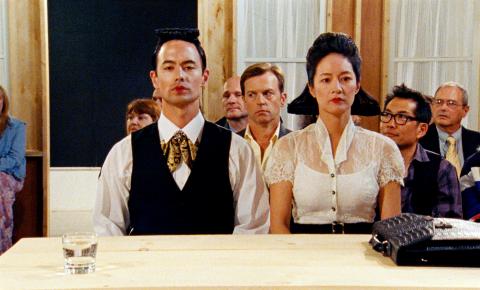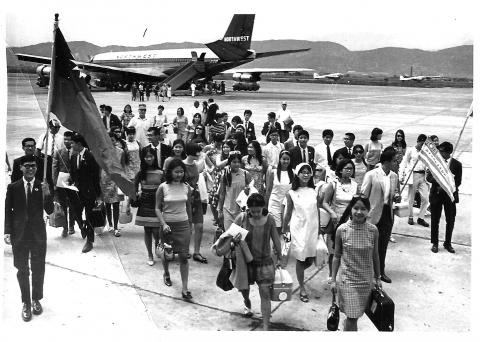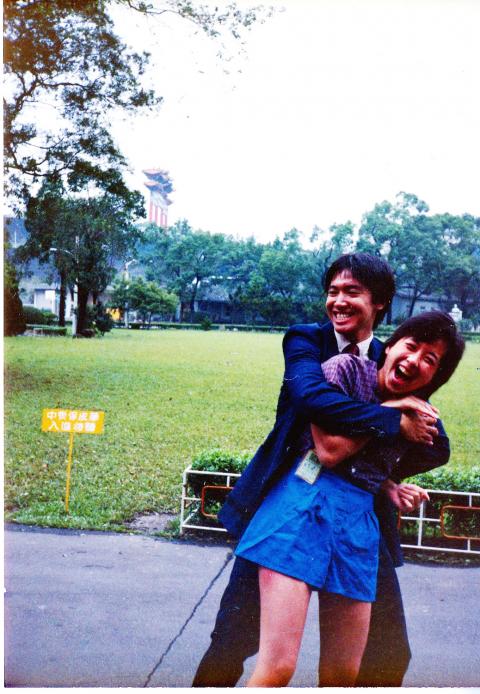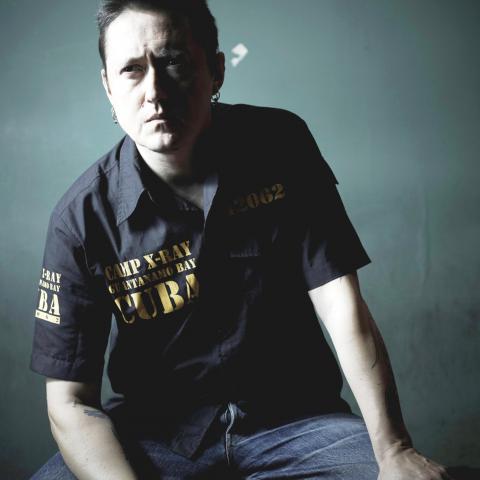Filmmaker Valerie Soe’s Taiwanese camera crew had never heard of the “Love Boat,” even though it has been taking place since 1967. Officials Soe interviewed were not happy with the moniker, whose preferred name is “Overseas Compatriot Youth Summer Formosa Study Tour,” — but that probably wouldn’t have registered either.
“The government officials’ idea of what the program is about is quite different from what it actually was,” Soe says. “They said it’s not about romance; it′s about learning your culture, your language and so forth.”
It wasn’t a small program. In its heyday from the 1980s to the early 2000s, the six-week cultural and language tour lured more than 1,000 overseas Taiwanese and Chinese to Taiwan every summer — including Soe, a Chinese-American who participated in 1982. The tour earned its moniker as it became a hotbed for romance and hookups, and parents would pay for the trip in the hope that their children would find a fellow Chinese or Taiwanese spouse.

Photo courtesy of Urban Nomad
“It worked for a lot of people, apparently,” Soe says.
The “Love Boat” experience stuck with Soe, who is now a professor of Asian American Studies at San Francisco State University, so much so that she made a documentary about it. It turns out, many alumni — including several couples who met through the Love Boat — could not forget about it either, contacting Soe and eager to share their memories.
Love Boat: Taiwan made its world premiere on Saturday at the Los Angeles Asian Pacific Film Festival and will be debuting in Asia on May 26 as the closing film for the Urban Nomad Film Festival. Now in its 18th year, the festival kicks on Saturday and ends on May 27. The festival will show 25 feature films, 22 shorts and eight indie band music videos as well as a number of talks, concerts and special events. Many of the films are music focused because one festival theme explores the 50th anniversary of Woodstock, while others look at the latest developments in technology, art, culture and human behavior.

Photo courtesy of Valerie Soe
LOVE AFTER THE BOAT
Launched as Taiwan’s international status plummeted in the late 1960s, Soe says it was one of the first instances of the government using soft power to gain support — something it is still doing today. The political climate has greatly changed, and while both Chinese and Taiwanese-Americans identified as Chinese back then, that’s no longer the case. Soe’s mother’s family was active with the Chinese Nationalist Party (KMT) before they migrated to the US, enabling Soe to visit that summer despite having no ties to the country. Plus, there was no such program in China anyway.
“Did I go on the trip because I was already interested in Asian culture, or was it the other way around?” Soe muses. “It’s hard to say, but for a lot of people it was the first time they thought about Asia and have since been continuously interested in it.”

Photo courtesy of Valerie Soe
Due to the complicated nuances of this political background — some in the documentary will say they’re learning Chinese culture, others will say Taiwanese — and the political undertones of the Love Boat, Soe is a bit nervous to show the film in Taiwan.
“We touch on the history a little bit to acknowledge that there’s some complexity there,” she says. “I hope [the audience] cuts me some slack. With a film this length [at 65 minutes], you can’t go into too much detail as you have to keep the audience interested.”
By the time Soe returned to Taiwan in 2016, the Love Boat as she knew it was no more. Similar programs were much smaller and divided into areas of concentration — language learning, for example — instead of putting everyone together in one big steamy party. But the “love” part lives on, and Soe followed a Love Boat couple as they registered their marriage in Colorado and had their wedding in Hsinchu last November.

Photo courtesy of Urban Nomad Film Festival
THE REST OF THE GOODIES
Urban Nomad co-founder David Frazier was drawn to Soe’s film because it puts Taiwan in a transnational context.
“The Golden Horse Awards focus on Greater China, while the Taipei Film Festival is for Taiwanese filmmakers. We’re a little broader in who we allow in our competition,” Frazier says.

Photo courtesy of Urban Nomad
Including Love Boat, all but four of Urban Nomad’s offerings are Taiwan or Asia premieres. The opening film, People’s Republic of Desire (虛你人生), delves into China’s often bizarre live streaming industry, which is purportedly worth US$4.4 billion in revenues last year. Nine international filmmakers will be traveling to Taiwan to participate in talks and other events, such as Fermin Muguruza, a legendary Spanish ska-punk-reggae singer who will be throwing a party at nightclub Triangle after the screening of his film, Black is Betlza.
More Taiwanese work can be seen in the short film category, and one of the most unique features of the festival is its music video category, featuring visuals created for indie bands such as Deca Joins, Elephant Gym (大象體操) and Murky Crows (昏鴉). Frazier says the only other music video competition in Taiwan is the Golden Melody Awards, which mostly focuses on pop music.
Urban Nomad has featured this category for the past five years as YouTube becomes an ever-important venue for a musician to make it big. But is this reliance on visuals helping the music itself? Local music video producers will be discussing the question during one of the festival’s four panel discussions titled “When Video Kills Music.”
“One of the jurors proposed that question as a direction for discussion,” Frazier says. “That’s not a statement I’m advocating as festival director.”

Growing up in a rural, religious community in western Canada, Kyle McCarthy loved hockey, but once he came out at 19, he quit, convinced being openly gay and an active player was untenable. So the 32-year-old says he is “very surprised” by the runaway success of Heated Rivalry, a Canadian-made series about the romance between two closeted gay players in a sport that has historically made gay men feel unwelcome. Ben Baby, the 43-year-old commissioner of the Toronto Gay Hockey Association (TGHA), calls the success of the show — which has catapulted its young lead actors to stardom -- “shocking,” and says

The 2018 nine-in-one local elections were a wild ride that no one saw coming. Entering that year, the Chinese Nationalist Party (KMT) was demoralized and in disarray — and fearing an existential crisis. By the end of the year, the party was riding high and swept most of the country in a landslide, including toppling the Democratic Progressive Party (DPP) in their Kaohsiung stronghold. Could something like that happen again on the DPP side in this year’s nine-in-one elections? The short answer is not exactly; the conditions were very specific. However, it does illustrate how swiftly every assumption early in an

Inside an ordinary-looking townhouse on a narrow road in central Kaohsiung, Tsai A-li (蔡阿李) raised her three children alone for 15 years. As far as the children knew, their father was away working in the US. They were kept in the dark for as long as possible by their mother, for the truth was perhaps too sad and unjust for their young minds to bear. The family home of White Terror victim Ko Chi-hua (柯旗化) is now open to the public. Admission is free and it is just a short walk from the Kaohsiung train station. Walk two blocks south along Jhongshan

Francis William White, an Englishman who late in the 1860s served as Commissioner of the Imperial Customs Service in Tainan, published the tale of a jaunt he took one winter in 1868: A visit to the interior of south Formosa (1870). White’s journey took him into the mountains, where he mused on the difficult terrain and the ease with which his little group could be ambushed in the crags and dense vegetation. At one point he stays at the house of a local near a stream on the border of indigenous territory: “Their matchlocks, which were kept in excellent order,